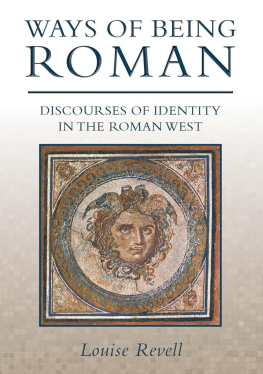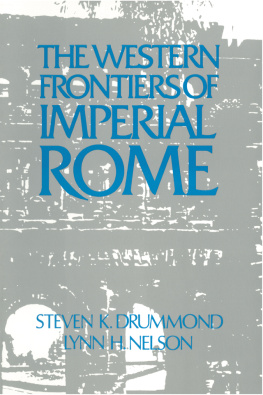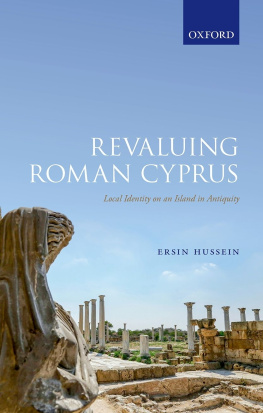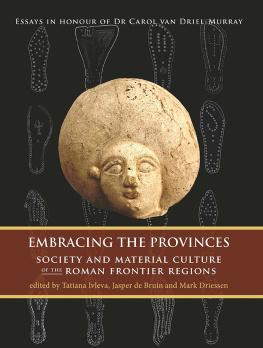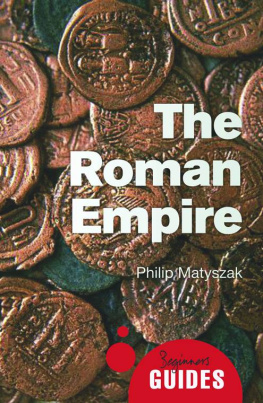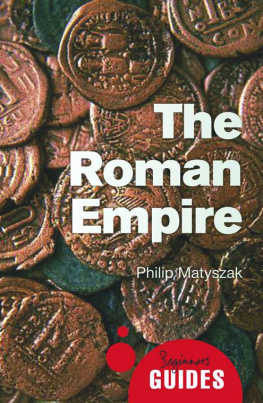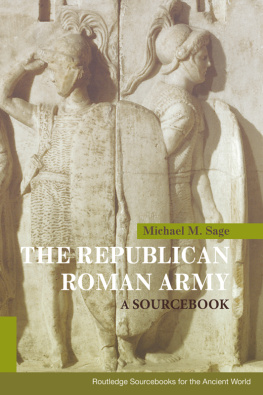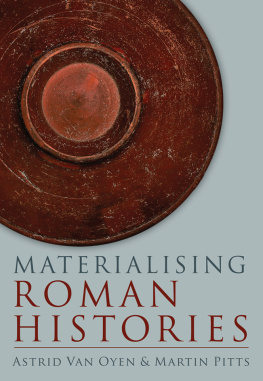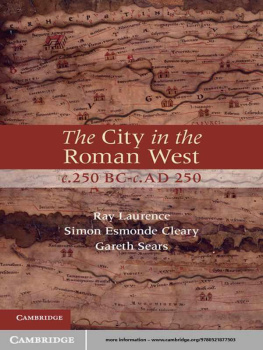Published in the United Kingdom in 2016 by
OXBOW BOOKS
10 Hythe Bridge Street, Oxford OX1 2EW
and in the United States by
OXBOW BOOKS
1950 Lawrence Road, Havertown, PA 19083
Oxbow Books and the author 2016
Paperback Edition: ISBN 978-1-84217-292-6
eISBN 9781785701887
A CIP record for this book is available from the British Library
Library of Congress Cataloging-in-Publication Data
Names: Revell, Louise.
Title: Ways of being Roman : discourses of identity in the Roman West / Louise Revell.
Description: Oxford : Oxbow Books, 2015. | Includes bibliographical references.
Identifiers: LCCN 2015034193 | ISBN 9781842172926 (paperback)
Subjects: LCSH: Identity (Psychology)Social
aspectsRomeProvincesHistory. | EthnicityRomeProvincesHistory.
| Social statusRomeProvincesHistory. | Gender
identityRomeProvincesHistory. | Age
groupsRomeProvincesHistory. | Roman provincesSocial conditions. |
Roman provincesAntiquities. | Social archaeologyRomeProvinces. |
RomeHistoryEmpire, 30 B.C.-284 A.D. | RomeHistoryEmpire, 284-476
Classification: LCC DG87 .R48 2015 | DDC 937/.06dc23 LC record available at http://lccn.loc.gov/2015034193
All rights reserved. No part of this book may be reproduced or transmitted in any form or by any means, electronic or mechanical including photocopying, recording or by any information storage and retrieval system, without permission from the publisher in writing.
Printed in the United Kingdom by Hobbs the Printers Ltd, Totton, Hampshire
For a complete list of Oxbow titles, please contact:
UNITED KINGDOM
Oxbow Books
Telephone (01865) 241249, Fax (01865) 794449
Email: oxbow@oxbowbooks.com
www.oxbowbooks.com
UNITED STATES OF AMERICA
Oxbow Books
elephone (800) 791-9354, Fax (610) 853-9146
Email: queries@casemateacademic.com
www.casemateacademic.com/oxbow
Oxbow Books is part of the Casemate Group
Front cover: Mosaic of Medusa (MNAT 2921; photo: MNAT)
Back cover: La maison du buste en argent, Vaison-la-Romaine (photo: author)
Acknowledgements
This book has been a long time in writing. During this time, a large number of people have contributed to it either directly or indirectly through general discussions about Roman identity and social archaeology. Thanks go to Matthew Johnson for encouraging me to write this, and Stephanie Moser for support throughout the process; to Tim Champion and Yvonne Marshall for discussions about ethnicity and feminist theory respectively. Ray Laurence and Mary Harlow encouraged my interest in family and age. A great debt is owed to Natalie Kampen for reminding me that Roman archaeology is more than just the men talking to the men about the men, and to the remarkable group she assembled for the Getty sponsored Arts of Romes Provinces for much discussion and debate. The book was informed by a module I taught for a number of years on Roman Identities, and I would like to thank all the students who contributed to the formation of the ideas here. At Oxbow, Clare Litt and Julie Gardiner have proved supportive throughout. Hella Eckardt, Simon Keay, Seville Archaeological Museum and the British Museum kindly granted me permission to use particular images. Lucy Elkerton, Josh Pollard, Alison Moore and Martin Millett read the full draft, and made helpful comments; any errors remain my own. Finally, I would like to thank my husband, Mike Blumenthal, for love and support and keeping me sane.
Preface
The multiple aspects which form the identity of any single person in the past intertwine to form a complex matrix of encounters and experiences. The temporal and geographical range of the Roman empire increases these exponentially, making generalisation even more difficult. And yet there are clear lines of discourse through which these identities are negotiated: ideologies and activities which take on a prominence at any one time. My intention in this book is to look at some of the structures through which various aspects of Roman identities were formed. I am not looking for the individual experience, a hypothetical paradigm of Roman-ness, but rather the ways in which it was possible to act in the past. I am not going to concentrate purely on Roman-ness, or ethnicity, but look at the multiples aspects of identity: age, gender, status, and how these intersect. It is not an exhaustive account, more an examination of the way in which various kinds of identities may have been formed, with the implicit assumption that such approaches can be used to investigate other forms of identities.
Nevertheless, there are a number of essential points which influence the approach which I shall take in this book. The first is that identity is not static: it is not fixed, but rather something which is reinforced on a daily basis through the interaction between the individual, other members of the society, and the social structures through which that society is organised. Similarly, identity can change through the progression of a persons life, not only in terms of age categories, but also the ways in which gender is understood, or professional identities created. Therefore, I am not trying to reconstruct the experience of an individual. Instead I am interested in the discourse or social structures through which any individual understood who they were and made their actions meaningful in Roman society, and the material manifestations of these discourses. However, these discourses or ideologies were not neutral or value-free. Inherent within them was a sense of inequality. Certain activities or identities were judged more acceptable, others were seen as lesser and marginalised. Implicit within this are the power relations and hierarchies within Roman society: some kinds of people were valued over others, or had greater access to resources for power. Identity and the ideology of identity came to legitimise these inequalities, making them seem natural and obvious to the members of the community.
The material which follows will be presented according to aspects of identity; nevertheless, it should be noted that these are somewhat artificial divisions and that there are some themes which cross-cut the various elements, such as the idea of virtus or moral standing. Similarly, the multi-vocality of material culture and social practice mean that the same activities and discourse which mediate status, for example, are also used in the mediation of gender. In any persons daily life these would overlap and interact. However, the advantage of discussing the material in this way is that it allows us to emphasis the way these themes become part of a discourse, rather than a single, unchanging entity. We can also look at the ways in which these discourses are expressed through multiple forms of material culture. This material culture not only provides our evidence for these past identities, it also formed the medium through which these identities were negotiated and expressed. As such, it is subject to distortion, not merely in terms of what we understand as bias: it is the way in which certain identities were privileged and made more visible. By looking at the discourses, we can explore the way in which certain identities were made invisible, and so begin to fill in the gaps of the possibilities of experience.

